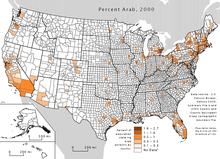History of Palestinians in Los Angeles
| Part of a series on |
| Ethnicity in Los Angeles |
|---|
|
Los Angeles County contains a community of Palestinian Americans.[1]
History[]
The first wave of Palestinian migration to the United States occurred in 1908 when the Ottoman Empire began mandating military service for Palestinians. [1] The second wave occurred in 1948 after the Arab-Israeli War caused many Palestinians to leave their homes. The third and largest wave occurred in 1967 as a result of the Six-Day War in Israel. Although the majority of Palestinian immigrants settled on the East Coast, economic opportunity brought large concentrations of Palestinians to Los Angeles.[1]
Demographics[]

No reliable immigration or census figures exist for Palestinian Americans. The count of Palestinian-Americans is complicated by the lack of a Middle East origin box to check on Census forms, leading the majority of Palestinians to self report as "white."[2] The population of the Palestinian diaspora in California is estimated to be 57,222 (after adjusting for undercounting), of which approximately 15,000 live in Los Angeles County.[3] Foreign born Palestinians in Los Angeles County originate mostly from Asia and the Middle East, followed by Latin America.[4]
Discrimination[]
In the 1970s, a series of terrorist attacks took place against prominent Palestinian-American activists and institutions, culminating in the murder of anti-discrimination activist Alex Odeh in Santa Ana in 1985.[5] In 1987, eight Palestinians were arrested in Los Angeles. They were charged under an antiquated anti-communism law called the McCarran-Walter Act that accused them of "supporting an organization that advocated world communism" for their possible association with the Popular Front for the Liberation of Palestine.[6] According to the ACLU, the eight were "prosecuted for ideas, beliefs and thoughts of a magazine for which none have been writers or editors.”[7]
Economy[]
As of 2010, there were 1,793 Palestinians over the age of 16 living in the Los Angeles County area, 65% of whom were in the labor force (employed or seeking employment).[4] The unemployment rate at this time was 2.8%: much lower than the national average for the USA.[4] The majority of Palestinians in LA work in the private sector (65% of workers), with 18.4% employed by the Government and 10.2% self-employed.[4] The management, business, science and arts sector employs the highest percentage of Palestinians in LA, followed by sales and office work.[4] Based on the 893 total households included in 2010 US Census data, the mean household income for Palestinians in LA County was $96,729: higher than the national average for the USA.[4]
Education[]
The majority of Palestinians in LA enrolled in school attend elementary school, followed by graduate school and college. 46.8% of the Palestinian Diaspora in LA over 25 years old hold a bachelor's degree or higher and 89.6% are educated to high school level or higher.[4]
Institutions[]
The Palestinian diaspora in Los Angeles has a variety of organizations and institutional groups.
In 1930, Palestinian Jews in Los Angeles organized "Agudath Eretz Israel of Los Angeles", the first Palestinian-Jewish organization in the American Southwest. The organization including several Palestinian Sephardim.[8] The Palestinian-born Orthodox Rabbi Solomon Michael Neches of Congregation Talmud Torah served as President and Abraham Fleishman as Vice President.[9] Hailing from Jerusalem, Rabbi Neches was heavily involved in the American Zionist movement and supported the creation of a Jewish state in Palestine.[10] A September 1930 article from the B'nai B'rith Messenger announced a celebration of the founding of Agudath Eretz Israel of Los Angeles, noting that "All Palestinians of Los Angeles and vicinity" were invited and that the event hosted features of Palestinian life and talent from Eretz Yisrael, including Haluzim (pioneer) song and dance as well as the Palestinian guest speaker Rev. Cantor Naftali Herz Halevi.[11]
Political organizations with chapters in Los Angeles include: Al-Awda, dedicated to the Palestinian right of return,[12] Palestinian American Women's Association, which works toward the empowerment and education of Arab American women and children,[13] and American Muslims for Palestine, which works toward educating people about Palestine in order to motivate changes in US foreign policy regarding Palestine.[14]
Los Angeles County also has humanitarian relief organizations such as: Palestinian Children's relief, a non profit which focuses on providing medical relief and aid for younger Palestinians in the Middle East,[15] and Islamic Relief which provides humanitarian aid to communities after disasters.[16]
Notable persons[]
References[]
- ^ a b c Kurson, Ken. "Palestinian Americans". Countries and Their Cultures. Retrieved 24 November 2014.
- ^ "Are Arabs and Iranians white? Census says yes, but many disagree". www.latimes.com. Retrieved 2021-01-08.
- ^ "Arab American Institute Foundation Census for California" (PDF).
- ^ a b c d e f g US Census Bureau, 2006-2010 American Community Survey
- ^ "Los Angeles Intifada". Michigan Quarterly Review. 2020-10-14. Retrieved 2021-01-08.
- ^ Cole, David; Bennis, Phyllis (Winter 1996). "Ten Years of the Los Angeles Eight Deportation Case: Interview with David Cole". Middle East Report. 202 (Power, Poverty and Urban Survival): 41. doi:10.2307/3013042. JSTOR 3013042.
- ^ Gabriel, Judith. "Palestinians Arrested in Los Angeles Witch-hunt". Retrieved 24 November 2014.
- ^ "The Columbia History Of Jews And Judaism In America [PDF]". Columbia University. Retrieved 2021-10-02.
- ^ "Palestinian Jews of Los Angeles Organize Selves". Jewish Telegraphic Agency. Retrieved 2021-10-02.
- ^ "Congregation Talmud Torah of Los Angeles". National Register of Historic Places. Retrieved 2021-10-02.
- ^ "Palestinians of Los Angeles Celebrate". National Library of Israel. Retrieved 2021-10-02.
- ^ "Al Awda".
- ^ "Palestinian Women's Association".
- ^ "American Muslims for Palestine". Archived from the original on 2014-11-14. Retrieved 2014-11-24.
- ^ "Palestinian Children's Relief". Archived from the original on 2014-11-20. Retrieved 2014-11-24.
- ^ "Islamic Relief".
- Arab-American culture in California
- Middle Eastern-American culture in Los Angeles
- Palestinian-American culture
- Ethnic groups in Los Angeles